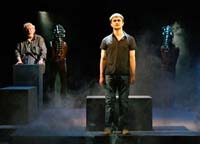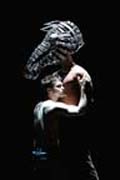By Lucy Komisar
Personal demons rooted in a childhood traumatized by religion and repressed sexuality move this powerful play by Peter Shaffer, first staged in 1973. It is vividly directed by Thea Sharrock who brings an emotional intensity to the mysterious tale.
A troubled 17-year-old youth, Alan Strang (Daniel Radcliffe) is brought by a judge (Kate Mulgew) to the office of an overworked psychiatrist in a provincial hospital in southern England. He has blinded a stable of six horses. Slowly, through importuning, bribes of small gifts and even hypnotism, the psychiatrist, Martin Dysart (Richard Griffiths) gets him to see through his nightmares and tell what brought him to commit this horror.
The boy’s father (T. Ryder Smith) is working class, a printer; his mother (Carolyn McCormick) is a housewife and fanatically religious. She puts a picture of Christ on the wall opposite her son’s bed. The youth’s sexual fantasies are repressed and redirected to his passion for horses. He confuses them with Christ. The stable where he works becomes a temple. He fantasizes that God speaks, Behold I give you Equus my only begotten son. He believes that like Jesus on the wall, the horse is in chains for the sins of the world.
A subtext is the Madonna and the whore. The boy’s downfall is his seduction in the stables by a co-worker, Anna (Jill Mason), and a shocking discovery about his father. His considers both as betrayals of Equus and God, who have in his eyes become one.
 On the bare set, 4 large gray blocks are shifted to be the doctor’s office, the stables and other sites of the play. In Sharrock’s stunning staging, the horses, magically conjured up by men in metal shoe stilts and metal sculpted horses heads, take dance-like steps choreographed by Fin Walker. A turntable allows them to canter into imagined spaces of beach and field.
On the bare set, 4 large gray blocks are shifted to be the doctor’s office, the stables and other sites of the play. In Sharrock’s stunning staging, the horses, magically conjured up by men in metal shoe stilts and metal sculpted horses heads, take dance-like steps choreographed by Fin Walker. A turntable allows them to canter into imagined spaces of beach and field.
Dysart, with his own passions and doubts, feels jealous of the passion of the boy. He thinks, Without worship, you shrink. But in this case, passion was not uplifting but appallingly destructive.
Radcliffe is chilling in his portray of the disturbed boy. Griffiths is curiously passive and uninvolved as the psychiatrist.
Review at NYTheatre-Wire site

